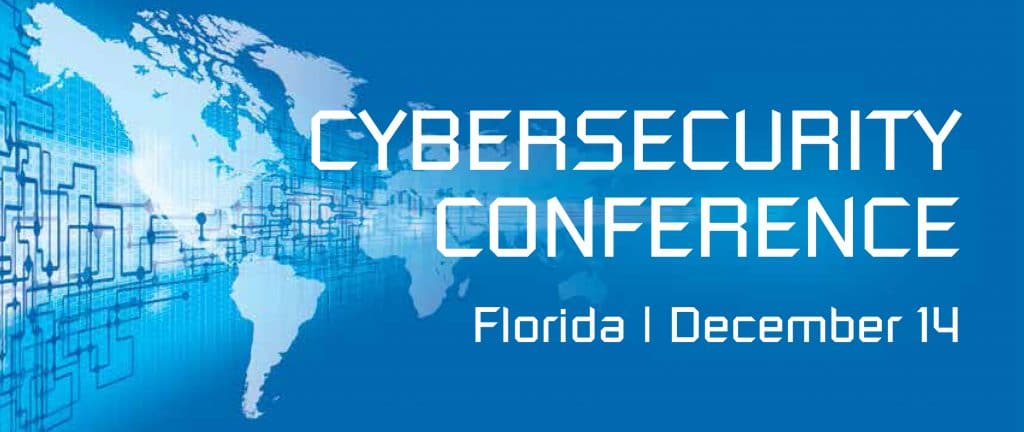
Holiday Connections in Miami
May 22, 2018
2018 South Florida Economic Summit
May 22, 2018
December 14, 2017
8:30 AM to 4:00 PM
FIU | Graham Center Ballrooms | 11200 SW 8 Street, Miami, FL 33199
On Thursday, December 14 Florida International University, the Greater Miami Chamber of Commerce, and the U.S. Chamber of Commerce will host the Cybersecurity Conference bringing together top experts both locally and nationally from government, law enforcement, and the private sector to help business leaders develop, evaluate, and strengthen their cybersecurity programs.
For more details: Cybersecurity Conference
0900-0905: Opening Remarks
Ann M. Beauchesne, Senior Vice President, U.S. Chamber of Commerce (emcee)
0905-0930: Welcoming Remarks
Alejandro Mayorkas, Partner, WilmerHale; Chairman, U.S. Chamber of Commerce Cyber Leadership Council; and former Deputy Secretary, U.S. Department of Homeland Security
0930-1000: Role of DHS in Cybersecurity
Jeanette Manfra, Assistant Secretary for Cybersecurity and Communications, National Protection and Programs Directorate, U.S. Department of Homeland Security (invited)
Cyber threats are increasing in frequency, scale, and sophistication and cybersecurity must be a partnership between government and industry. Manfra will discuss how DHS executes its mission as the central federal interface for the private sector in responding to and recovering from cyber threats. She will also discuss how DHS is improving and expanding its capability to send and receive cyber threat information to the private sector.
1000-1045: Panel Discussion: Small Business Cybersecurity
Moderator: Ann M. Beauchesne, Senior Vice President, U.S. Chamber of Commerce
Chris Furlow, President, Ridge Global
Allen Gutierrez, Associate Administrator of the Office of Entrepreneurial Development, U.S. Small Business Administration (tentative)
Michael Myhre, CEO and Network State Director, Florida SBDC Network
Adam Sedgewick, Technology Policy Advisor, Office of Policy and Strategic Planning, U.S. Department of Commerce
Small does not necessarily mean secure. More and more, small and midsize businesses are targeted for cyberattacks because they typically lack there sources to adequately defend themselves. Cybersecurity is no longer an IT problem; it is an organizational problem. So how do businesses find a balance between cost and security? What resources exist for businesses to enhance cybersecurity? This panel will provide an overview of existing frameworks and advice on finding affordable solutions to cybersecurity challenges.
1045-1100: Networking Break
1100-1130: Industry Keynote
Ed Cabrera, Chief Cybersecurity Officer, Trend Micro
1130-1215: Panel Discussion: Public-Private Collaboration on Cyber Incident Response
Moderator: Ray Watts, Principal Consultant, Cybis LLC
Jason Manar, Supervisory Special Agent, Special Agent, FBI
Brad Leopard, Supervisor, Electronic Crimes Task Force, U.S. Secret Service
Local law enforcement, the FBI, and the Secret Service are often the first entities to learn of criminals’ access to networks. Engaging law enforcement to build trusted public-private partnerships is essential to confirming a crime and beginning a criminal investigation. Business leaders need to understand the respective roles of the FBI and the Secret Service, how law enforcement shares information with businesses, and the importance of reporting cyber incidents to law enforcement.
1215-1230: Networking Break
1230-1330: Lunch
12:45-1330: Luncheon Keynote: Combating Cyber Threats to U.S. National Security
TBD
Introduced by: Dr. Mark B. Rosenberg, President, Florida International University
Florida businesses face blended threats—criminal and national security—to their digital networks. In today’s interconnected economy, industry is a key partner in confronting these threats. A seemingly small cyber intrusion by a criminal actor on a U.S. business may transmit personally identifiable information to a terrorist network or fund militant activity on battlefields far from U.S. jurisdiction. Scott will discuss these cyber threats and actors and how critical cooperation between businesses and federal agencies works to disrupt cyberattacks.
1330-1345: Networking Break
1345-1430: Panel Discussion: Business Case for Cybersecurity | Managing the Risk of Insecurity
Moderator: Ian Wallace, Co-Director, Cybersecurity Initiative, New America (tentative)
Cindy Donaldson, President, Global Resilience Federation
William Murphy, VIPRE Security (tentative)
TBD
TBD
Addressing cybersecurity threats to American and global businesses has gone from an IT issue to a priority for the C-suite and the boardroom. For many businesses, it is not a matter of if an intrusion will happen, but when. In an interconnected world, economic security and national security are linked. People and business leaders need to manage cyber risks to their organizations. Technology is only part of the solution. Directors and officers are responsible for protecting the assets—e.g., devices and data—of their companies. Do boards and senior executives appreciate the costs—e.g., legal, public relations, regulatory, and reputational—of a consequential attack? What are some effective ways to talk to company leaders about securing cybersecurity resources?
1430-1515: LIVE HACK
Selcuk Uluagac, Assistant Professor, FIU Department of Electrical and Computer Engineering, and Amit Kumar Side, Ph.D. Student, FIU Department of Electrical and Computer Engineering
The world has woken up to the Internet of Things, but it is clear that the IoT has not woken up to its responsibilities. With every new product comes the risk that it will disclose private user data, provide an increased attack surface, and further enable mega-DDoS attacks. TBD will show you how hackers can abuse IoT devices because of poor standards and how some manufacturers attempt to dodge their responsibilities.
1515-1530: Closing Remarks
Ann M. Beauchesne, Senior Vice President, U.S. Chamber of Commerce
For more details: Cybersecurity Conference
Program Agenda
0830-0900: Registration and Breakfast Networking0900-0905: Opening Remarks
Ann M. Beauchesne, Senior Vice President, U.S. Chamber of Commerce (emcee)
0905-0930: Welcoming Remarks
Alejandro Mayorkas, Partner, WilmerHale; Chairman, U.S. Chamber of Commerce Cyber Leadership Council; and former Deputy Secretary, U.S. Department of Homeland Security
0930-1000: Role of DHS in Cybersecurity
Jeanette Manfra, Assistant Secretary for Cybersecurity and Communications, National Protection and Programs Directorate, U.S. Department of Homeland Security (invited)
Cyber threats are increasing in frequency, scale, and sophistication and cybersecurity must be a partnership between government and industry. Manfra will discuss how DHS executes its mission as the central federal interface for the private sector in responding to and recovering from cyber threats. She will also discuss how DHS is improving and expanding its capability to send and receive cyber threat information to the private sector.
1000-1045: Panel Discussion: Small Business Cybersecurity
Moderator: Ann M. Beauchesne, Senior Vice President, U.S. Chamber of Commerce
Chris Furlow, President, Ridge Global
Allen Gutierrez, Associate Administrator of the Office of Entrepreneurial Development, U.S. Small Business Administration (tentative)
Michael Myhre, CEO and Network State Director, Florida SBDC Network
Adam Sedgewick, Technology Policy Advisor, Office of Policy and Strategic Planning, U.S. Department of Commerce
Small does not necessarily mean secure. More and more, small and midsize businesses are targeted for cyberattacks because they typically lack there sources to adequately defend themselves. Cybersecurity is no longer an IT problem; it is an organizational problem. So how do businesses find a balance between cost and security? What resources exist for businesses to enhance cybersecurity? This panel will provide an overview of existing frameworks and advice on finding affordable solutions to cybersecurity challenges.
1045-1100: Networking Break
1100-1130: Industry Keynote
Ed Cabrera, Chief Cybersecurity Officer, Trend Micro
1130-1215: Panel Discussion: Public-Private Collaboration on Cyber Incident Response
Moderator: Ray Watts, Principal Consultant, Cybis LLC
Jason Manar, Supervisory Special Agent, Special Agent, FBI
Brad Leopard, Supervisor, Electronic Crimes Task Force, U.S. Secret Service
Local law enforcement, the FBI, and the Secret Service are often the first entities to learn of criminals’ access to networks. Engaging law enforcement to build trusted public-private partnerships is essential to confirming a crime and beginning a criminal investigation. Business leaders need to understand the respective roles of the FBI and the Secret Service, how law enforcement shares information with businesses, and the importance of reporting cyber incidents to law enforcement.
1215-1230: Networking Break
1230-1330: Lunch
12:45-1330: Luncheon Keynote: Combating Cyber Threats to U.S. National Security
TBD
Introduced by: Dr. Mark B. Rosenberg, President, Florida International University
Florida businesses face blended threats—criminal and national security—to their digital networks. In today’s interconnected economy, industry is a key partner in confronting these threats. A seemingly small cyber intrusion by a criminal actor on a U.S. business may transmit personally identifiable information to a terrorist network or fund militant activity on battlefields far from U.S. jurisdiction. Scott will discuss these cyber threats and actors and how critical cooperation between businesses and federal agencies works to disrupt cyberattacks.
1330-1345: Networking Break
1345-1430: Panel Discussion: Business Case for Cybersecurity | Managing the Risk of Insecurity
Moderator: Ian Wallace, Co-Director, Cybersecurity Initiative, New America (tentative)
Cindy Donaldson, President, Global Resilience Federation
William Murphy, VIPRE Security (tentative)
TBD
TBD
Addressing cybersecurity threats to American and global businesses has gone from an IT issue to a priority for the C-suite and the boardroom. For many businesses, it is not a matter of if an intrusion will happen, but when. In an interconnected world, economic security and national security are linked. People and business leaders need to manage cyber risks to their organizations. Technology is only part of the solution. Directors and officers are responsible for protecting the assets—e.g., devices and data—of their companies. Do boards and senior executives appreciate the costs—e.g., legal, public relations, regulatory, and reputational—of a consequential attack? What are some effective ways to talk to company leaders about securing cybersecurity resources?
1430-1515: LIVE HACK
Selcuk Uluagac, Assistant Professor, FIU Department of Electrical and Computer Engineering, and Amit Kumar Side, Ph.D. Student, FIU Department of Electrical and Computer Engineering
The world has woken up to the Internet of Things, but it is clear that the IoT has not woken up to its responsibilities. With every new product comes the risk that it will disclose private user data, provide an increased attack surface, and further enable mega-DDoS attacks. TBD will show you how hackers can abuse IoT devices because of poor standards and how some manufacturers attempt to dodge their responsibilities.
1515-1530: Closing Remarks
Ann M. Beauchesne, Senior Vice President, U.S. Chamber of Commerce
